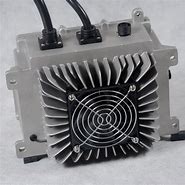Development of Onboard Charger
As the automotive industry undergoes a monumental shift towards electrification, the spotlight is increasingly focused on the development of on board charger (OBCs) – the essential component responsible for replenishing electric vehicle (EV) batteries. The current landscape of OBC development is marked by rapid advancements aimed at addressing key challenges and enhancing the overall charging experience for EV owners. Let's delve into the exciting progress and innovations driving this critical technology forward.
Power and Efficiency Optimization: One of the primary focuses in OBC development is maximizing charging power while simultaneously improving energy efficiency. Manufacturers are investing significant resources into research and development to achieve higher power outputs without compromising on efficiency. By leveraging advanced power electronics and intelligent charging algorithms, modern OBCs can deliver faster charging speeds while minimizing energy losses, ultimately reducing charging times and improving overall driving range.
Compact Design and Integration: Another notable trend in OBC development is the pursuit of compact, lightweight designs that seamlessly integrate into the vehicle's architecture. Shrinking the size and weight of onboard chargers not only helps conserve valuable space within the vehicle but also contributes to improved aerodynamics and overall efficiency. Engineers are exploring innovative packaging solutions and leveraging high-density components to achieve greater power density without sacrificing reliability or performance.
Bi-Directional Charging Capabilities: Beyond simply replenishing the vehicle's battery, the latest OBCs are being equipped with bi-directional charging capabilities, enabling energy flow between the vehicle and the electrical grid. This bidirectional functionality opens up a host of opportunities, including vehicle-to-grid (V2G) integration, energy storage, and grid stabilization. By enabling EVs to serve as mobile energy storage units, OBCs are poised to play a pivotal role in supporting renewable energy integration and enhancing grid resilience.

Enhanced Connectivity and Smart Features: OBCs are becoming increasingly interconnected, equipped with advanced communication capabilities and smart features that enable seamless integration with external charging infrastructure and smart grid systems. Vehicle-to-infrastructure (V2I) communication allows OBCs to interact with charging stations, dynamically adjust charging parameters based on grid conditions, and optimize charging schedules to minimize costs and maximize efficiency. Additionally, built-in diagnostics and remote monitoring capabilities enable proactive maintenance and troubleshooting, ensuring reliable operation and minimizing downtime.
Standardization and Interoperability: With the proliferation of electric vehicles from various manufacturers, there is a growing emphasis on standardization and interoperability of OBCs to facilitate widespread adoption and compatibility across different charging networks. Industry stakeholders are working collaboratively to establish common standards and protocols for OBC communication, connector interfaces, and charging protocols, simplifying the charging process for consumers and promoting interoperability between different EV models and charging infrastructure providers.
In conclusion, the current development of on board charger is characterized by a relentless pursuit of innovation aimed at delivering faster, more efficient, and more versatile charging solutions for electric vehicles. From power and efficiency optimization to compact design, bi-directional capabilities, enhanced connectivity, and standardization efforts, OBCs are evolving rapidly to meet the evolving needs of the electrified transportation ecosystem. As technology continues to advance and economies of scale drive down costs, onboard chargers will play an increasingly integral role in shaping the future of mobility and accelerating the transition towards sustainable transportation.
评论
发表评论